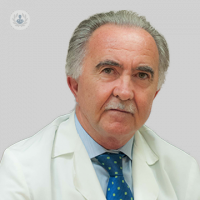Prostate cancer: causes, diagnosis and treatments
Written by:
What is it and why prostate cancer occurs?
Prostate cancer, like any type of cancer or most of them do not know why it occurs. What we do know is that it is the most common in men from age 50 cancer and, therefore, what we need is extreme a little searching, or active search people or men who may suffer cancer prostate, because like most cancers, if diagnosed soon have a very high chance of cure and that cancer does not limit or diminish the life expectancy of people who seem.
Who is affected by prostate cancer?
As I just discussed, prostate cancer affects males, usually above the fifth decade of life, ie, it is exceptional suffering from cancer of the prostate with less than 50 years, although it does happen. And as I have mentioned, is a cancer that becomes the most common male from that age, from the fifth decade of life, and also after lung cancer the most deadly conditions in men to from 50 to the end of their lives. Therefore it is a cancer concern to the medical community, the urological community because conditions or can influence the lives of thousands of people and can reduce the years of life that these people can have or can enjoy.
How is prostate cancer diagnosed?
The prostate biopsy has not changed much in recent years, but then yes I will clarify that there are very important things if they have changed. Usually it is very common, most often, a male suspect has or may have prostate cancer, because in an analysis called PSA (prostate specific antigen) levels are above a certain threshold. Not all men lintel must be the same, depends on the age, depends on the volume of the prostate, prostate depends that has had some problems previously inflammatory or infectious. But what is true is that most of the time is suspected that elevation of PSA. Once you suspect, identification of tumor usually almost always goes through a prostate biopsy, ie, urologists do, carry through a transrectal ultrasound perfectly identifies us that body and from there and from that image first took a series of samples at different prostatic areas and those are, on the one hand the suspicion with high PSA and on the other hand, confirmation by biopsy, which we will lead to a diagnosis of prostate cancer.
What are the latest techniques for treating prostate cancer?
It is true that in medicine, surgery and prostate cancer are seeing almost continuously a very significant development in diagnoses and treatments. We could say that there is a revolution in that we are able in many patients, not all but many patients, to identify exactly where it is located prostate cancer and have tests that tell us whether the tumor can be more or less aggressive. In that sense, until recently most urologists, virtually all urologists anywhere, offer radical treatments in prostate cancer: removal of the gland, radiation therapy, cryotherapy ...
Today slowly, but increasingly, we are able to select patients where we will deal exclusively where is focused the tumor, where the tumor is and not make a complete treatment of the rest of the body. That is a great benefit that primarily is to decrease the side effects of these treatments have. These patients will have after treatment less risk of impotence, less risk of urinary incontinence. If you still get the same so that survival is progress, it is a paradigm shift, spectacular.



